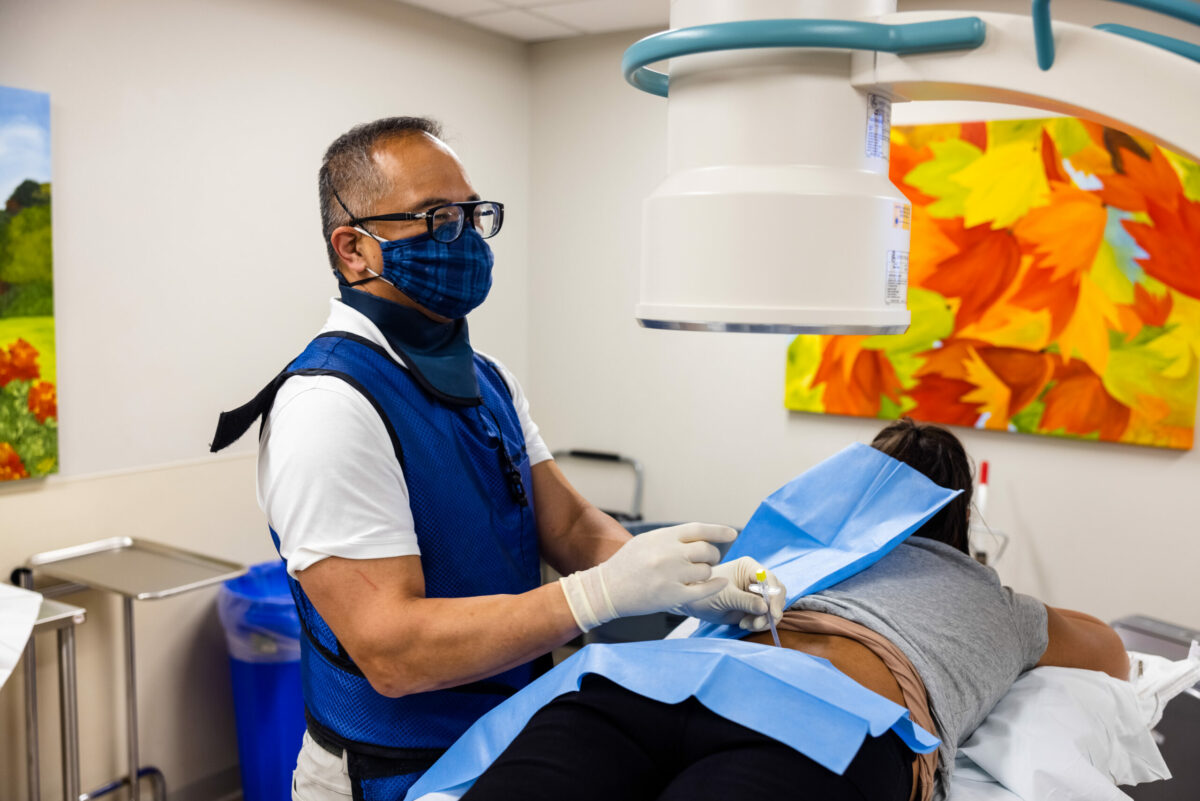
Cortisone shots and epidural steroid injections are designed to help relieve pain. However, these procedures can lead to patients to have several questions. The following FAQ about cortisone shots and epidural steroid injections will help relieve the patient’s procedural concerns.
FAQ About Cortisone Shots and Epidural Steroid Injections
What is a cortisone shot?
 A cortisone shot is a minimally invasive procedure where a steroid medication is injected into a specific body area to relieve pain by reducing inflammation. It is commonly used for joint pain, nerve pain, tendinitis, bursitis, and other inflammatory conditions.
A cortisone shot is a minimally invasive procedure where a steroid medication is injected into a specific body area to relieve pain by reducing inflammation. It is commonly used for joint pain, nerve pain, tendinitis, bursitis, and other inflammatory conditions.
How does a cortisone shot work?
Cortisone is a powerful anti-inflammatory medication that reduces inflammation and suppresses the targeted area’s immune response. It helps reduce pain by alleviating the inflammation caused by various conditions, allowing for improved function and pain relief.
Do you need to rest after a cortisone injection?
It is recommended to avoid strenuous activities for the first 24-48 hours after a cortisone shot. However, rest requirements may vary. Your healthcare provider will provide personalized instructions regarding activity restrictions and when you can resume your normal activities.
How long does it take for a cortisone shot to work?
The time it takes for a cortisone shot to work varies from person to person and depends on the condition being treated. Some individuals may experience immediate relief, while others may need several days or weeks to experience the full benefits. The duration of pain relief can also vary, with some experiencing long-lasting results and others requiring additional treatment.
What happens when a cortisone shot hits a nerve?
When a cortisone shot hits a nerve, it can cause nerve irritation, increased pain, numbness or tingling, weakness, or loss of sensation in the affected area. Prompt evaluation by a healthcare provider is necessary to address any potential complications.
What is an epidural steroid injection?
An epidural steroid injection (ESI) is a procedure in which a corticosteroid medication and often a local anesthetic is injected into the epidural space around the spinal nerve roots. It is commonly used to alleviate pain and inflammation associated with herniated discs, spinal stenosis, and nerve root compression.
How does an epidural steroid injection work?
An ESI delivers the corticosteroid medication directly to the affected nerve roots, reducing inflammation and pain. By targeting the inflamed area, the injection helps to relieve pressure on the nerves, allowing for pain relief and improved functionality.
How long does a steroid shot last?
The time it takes for an epidural steroid injection to relieve pain varies depending on the underlying condition and the individual. Some individuals may experience immediate relief, while others may require multiple injections over weeks for optimal results. It is important to follow up with your healthcare provider to determine the effectiveness of the injection and discuss any further treatment options.
Are epidural steroid injections safe?
Epidural steroid injections are generally safe when performed by trained healthcare professionals. However, as with any medical procedure, there are potential risks and side effects. These can include infection, nerve damage, allergic reactions, elevated blood sugar levels, and temporary flare-up of pain. It is critical to discuss the potential risks and benefits of the procedure with your healthcare provider before undergoing an epidural steroid injection.
How many epidural steroid injections can I have?
The number of epidural steroid injections one can have may vary depending on the underlying condition and individual response to treatment. Your healthcare provider will determine the appropriate treatment plan based on your needs.
What should I not do after a lumbar epidural steroid injection?
After a lumbar epidural steroid injection, you should avoid strenuous activities, driving, and soaking in water for at least 24 to 48 hours to minimize complications and allow the injection to work effectively.
How long is the immune system compromised after steroid injection?
The immune system may be compromised shortly after a steroid injection, typically lasting a few days to a week. However, this can vary depending on factors such as the type and dosage of the steroid medication and individual health conditions.
How long should you rest after a lumbar injection?
The recommended resting period after a lumbar epidural steroid injection is typically 24 to 48 hours. During this time, it is best to limit physical activities such as heavy lifting, bending, or twisting movements that can strain the lower back.
Can you lie on your back after an epidural injection?
It is generally safe to lie on your back after an epidural injection, but some individuals may experience temporary discomfort or pain at the injection site. Adjusting your position to lying on your side or using pillows for support is an option if it is uncomfortable. Discuss any concerns with your healthcare provider for personalized guidance.
Emerge Stronger. Healthier. Better.
If you or a loved one are seeking cortisone shots or epidural steroid injections, EmergeOrtho—Triangle Region’s experts will help you immediately. Our experienced team will work with you to develop a comprehensive treatment plan tailored to your unique needs so that you can Emerge Stronger, Healthier, and Better. Request an appointment, schedule an appointment, or call us any time at (919) 220-5255.







